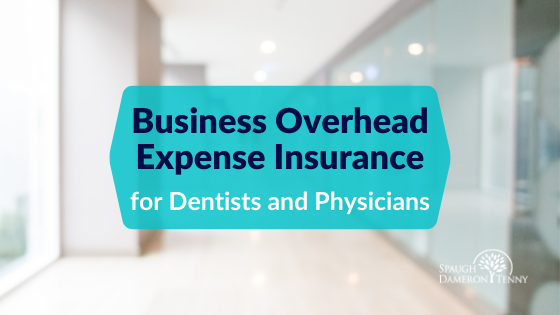Most doctors are aware that disability insurance protects your income in the event you suffer an injury or illness and cannot work. It helps with your personal expenses like bills, mortgage or rent, and student loan payments.

However, if you are also a business owner, drive the practice income, and become unable to work for an extended period of time due to a disability, how would you pay rent or the business' mortgage, make payroll, and take care of other practice-related expenses? Your individual disability policy likely will not include funds for temporarily hiring someone to replace you or protect your dental or medical practice.
One solution is a Business Overhead Expense (BOE) insurance policy. Also known as disability overhead expense insurance, BOE insurance pays a benefit to your business should you – the owner – become sick or hurt and cannot work. This insurance covers the costs of running your business, including day-to-day functions like paying wages, debts, and mortgage or rent.
Think about this – if you are the primary revenue generator for your practice, what would happen if you became sick or injured and could not work? How would you be able to cover the expenses of your business? Your individual disability insurance policy likely will not include funds to hire someone to replace you. Would you need to sell your practice quickly? Would you have to close your doors? Even a few months away from your practice may cause serious financial stress. Business overhead expense insurance allows you time to cover your bills while you heal and recover. With your expenses covered, you have time and peace of mind to make the best decision for you and your business.
As with individual disability insurance, the definition of disability is used by insurers to decide whether an individual qualifies to receive benefits. Typically, for BOE insurance, you must not be able to perform the primary responsibilities of your job, and you must be receiving care for your injury or illness from a physician.
Some, but not all, policies even cover the salary of a temporary or substitute physician or dentist hired to perform the duties of the disabled.
Ensure you and anyone else helping run the business know what is not covered by business overhead expense insurance. Expenses that are not covered include your own wages and profit, nor those of people who pay a share of your business expenses, income taxes, the cost of inventory, and the cost of furniture, to name a few.
To be eligible for coverage, you will need to be between 18 and 64 years of age, and have owned your dental or medical practice for a minimum of two years. In addition, your business will need to produce a certain amount of revenue, like how disability insurance requires proving your income.
It is essential to know how long the BOE insurance will last. Being clear on the period of time the insurer will pay you the monthly benefit will help determine your plan after you suffer the disability. Normally, the benefit period runs for either 18 or 24 months. In some cases, if you are between 61 - 64 years, there is also a 12-month benefit period for which you can apply. Remember, once you are healthy enough to return to work, the benefit period will end.
If you suffer a long-term disability, you may have up to two years to determine if you should sell or shut down your practice without worrying about accruing debt from business expenses.
The elimination period, also known as the waiting period, is the time you must wait after getting hurt or sick before the insurer will start paying your benefits. Similar to that of disability insurance, the elimination period is 30, 60, or 90 days. Choosing a lengthier elimination period means there is a greater chance you will recover from an injury or illness before the insurer has to pay benefits, but it can save you money on your premiums.
When you take out the policy, you can select your maximum monthly benefit amount. Try to find a policy that pays 100% of your monthly operating expenses up to your maximum monthly benefit amount.
When you receive BOE insurance benefits, the policy will only pay the actual overhead expenses if they are less than the maximum benefit. For example, if the maximum monthly benefit is $1,000 (for simplicity's sake), but the actual business overhead expenses are just $500, the benefit paid is $500. It is possible with some insurers that the unused $500 benefit can be applied to increase future monthly maximums or to extend the benefit period
Typically, BOE insurance benefits are subject to income tax, but the premiums may be tax-deductible as a business expense.
If you decide that business overhead expense coverage may be suitable for your business, please reach out to one of our financial planners at Spaugh Dameron Tenny to discuss your options.
We understand that building a successful practice is not an easy undertaking. It involves skills and expertise that you may not have been taught in medical or dental school. Our team of financial planners offers a consultative approach to help you understand your core objectives and work with you and your legal team to execute your strategy correctly. You are not alone in this; we are here to support and guide you.
CRN202305-282763

John Dameron has been a financial planner and partner with Spaugh Dameron Tenny since 2002. With the help of the SDT team, John created a lecture series called Physicians Financial Focus, authored a book entitled The Residents and Fellows Financial Survival Guide, and has coached hundreds of physicians from residency/fellowship into practice. His expertise has also been featured on KevinMD.
For doctors and their spouses, the life insurance application process can feel daunting and invasive as you may endure answering very personal ...
Read More →A growing number of dental practices are being purchased in a less traditional manner: through a dental service organization (DSO) owned by a private ...
Read More →Life Insurance Considerations for Doctors In Training September is Life Insurance Awareness Month (LIAM). How will you protect your biggest asset — ...
Read More →